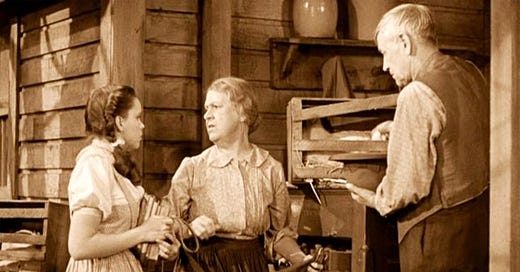Clara Blandick’s Auntie Em in The Wizard of Oz (1939) is a careworn woman with a harsh look about her, and she keeps a farm running by the skin of her teeth. She has no time for her niece Dorothy’s emotionalism, and when her farmhands are clowning around with Dorothy, she charges in with, “What’s this jabber-wapping when there’s work to be done?” Yet she gives them some good food to do the good work she expects.
Blandick’s Auntie Em is trying her best to be a figure of authority, more so than her husband Henry (Charley Grapewin), but she is as powerless against Margaret Hamilton’s rich and mean Miss Gulch as she is against the hurricane or twister that sweeps her niece up into a musical Technicolor dream world. Blandick’s voice throbs with suppressed emotion as she addresses the villainous woman who is seeking to destroy Dorothy’s dog Toto, addressing her by her first name, Almira Gulch. Can you hear Blandick saying that name in your head, the downward inflection she gives it?
The Wizard of Oz is one of those movies most of us have seen so many times, and so many times in childhood, that the inflections the people in it give their lines is often as important as the lines themselves, or more so. Auntie Em says that she has been waiting 23 years to tell Almira Gulch what she thinks of her, “But being a Christian woman, I can’t say it!” she cries as she leaves the room.
When Dorothy is returned to the home there is supposedly no place like, Auntie Em reassures her that “we dream lots of silly things.” Auntie Em, as played by Blandick, has her good points. But she is also an impotent, pleasure-denying figure, or she has been made that way by life on this Kansas farm. And that negativity is part of the image Blandick put across in her many film credits of the 1930s, when she freelanced for many studios as Aunts and gossiping matrons.
Blandick was born in 1876 and had a long stage career behind her before she started in talking pictures in 1930; she had won particular acclaim for her performance in a play called Hell-Bent Fer Heaven in 1924. She played Aunt Polly in a 1930 film of Tom Sawyer, and she was Joan Crawford’s worn-out Mother holding turnips in her hand in Possessed (1931): “You frighten me when you talk like that,” she says to her daughter, powerless as ever, as Crawford talks about wanting to get out of town and live.
Blandick made the most impression in several films she made with Barbara Stanwyck, most extensively as the smothering mother who pulls a gun in Shopworn (1932) and as a bigoted missionary in The Bitter Tea of General Yen (1933) who sees “Chinamen” as all one entity. Most characteristically, she was Aunt Mattie, the pill who tries to throw cold water on the Hollywood dreams of her niece (Janet Gaynor) in A Star Is Born (1937), and there is no question that Aunt Mattie’s home is a home to get out of. Her litany is, “You and your movies! They shouldn’t be allowed! You need to find a good husband!” Everything about Blandick in so many of her pictures has the mean, grim look of the worst of small town life.
Blandick worked more sparingly in the 1940s, and she was revealed as the murderer in a Philo Vance movie in 1947 and got a big scene that she knew how to work for effect: “I didn’t want to kill him!” she cries. “I didn’t want to kill anybody!” But times were hard for her after that, and she had bad health trouble in the late 1950s; her eyesight was starting to go, and she had arthritis. On April 15, 1962, Blandick came home from Palm Sunday service at her church. She brought out all the memorabilia of her career as an actress, photos and clippings, and arranged them so that everyone could see what she had accomplished.
Blandick put on a dressing gown of royal blue and fixed her hair and took sleeping pills, and then she lay back on a couch, put a golden blanket over her shoulders, and tied a plastic bag over her head. Her suicide note read, “I am now about to make the great adventure. I cannot endure this agonizing pain any longer. It is all over my body. Neither can I face the impending blindness. I pray the Lord my soul to take. Amen.”
What is striking about this ending to her life is that it is not something one of her movie characters would have done or thought of doing. A Clara Blandick character in a movie was built to endure and not enjoy, to pass judgment and kill enjoyment. Perhaps the woman who played those characters was somewhat different, though her staring eyes and pursed mouth so often told the story on screen of total deprivation with just a glance.





It's a sad story---her face haunts me---but so many of her characters are very unpleasant.
I had no idea about how she died. Wow. this is so interesting.